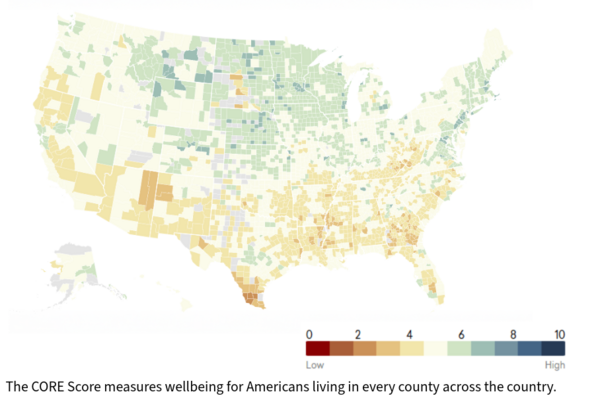Beyond GDP: New Tool Moves to Yale to Rethink How We Measure Economic Success

It’s the economy, stupid.
Right?
Political consultant James Carville coined this phrase to remind Bill Clinton’s 1992 campaign team about the top concern of American voters. But as decades have passed, political scientists have struggled to make sense of a growing disconnect between standard economic metrics and the public’s opinion about their economic prospects.
Last year, Donald Trump rode to victory as voters complained about the economy despite steady gains in the gross domestic product (GDP) and the stock market, low unemployment, and slowing inflation.
To help explain this disconnect, the American Academy of Arts & Sciences established the multi-disciplinary Commission on Reimagining Our Economy (CORE), which led to the creation of a new measurement to illuminate how Americans experience the economy. Released in 2023, the CORE Score provides a county-level nationwide sense of how Americans experience economic security and opportunity, health, and political efficacy.
And starting this month, the CORE Score website and infrastructure will move to Yale’s Institution for Social and Policy Studies, overseen by Jacob Hacker, the director of ISPS’s American Political Economy eXchange (APEX), a member of the Academy, and a member of the working group that developed the CORE Score.

“We are thrilled the CORE Score will have a permanent home at Yale,” said Laurie L. Patton, president of the academy. “We appreciate the university’s investment in improving our ability to analyze, explore, and — ultimately — better understand economic and societal shifts across the United States. While there are numerous indicators of how the economy is doing, the CORE Score provides much-needed insight into how Americans are doing. Yale’s Institution for Social and Policy Studies has the experience and expertise to maintain and share meaningful information with the public and policymakers. It’s a great example of how intellectual and institutional partnership makes us all stronger.”
Since the CORE Score’s creation in 2023, findings have been shared with the White House, the Federal Reserve, and other government agencies.
“Although the current economy has for years shown signs of strength — such as low unemployment and solid growth — many people still experience deep unease,” Hacker said. “Much of this worry stems from a broader feeling that our society is undergoing significant shifts and that our democratic institutions are not functioning as they should.”
As a member of the commission, Hacker led efforts to develop the CORE Score’s indicators measuring the degree to which Americans participate in their democracy and how well they are represented by their elected representatives in Congress. Other indicators measure an individual’s ability to meet economic needs and endure periods of instability, health coverage and life expectancy, and the possibility of creating a better life through economic opportunities.
Hacker views the new metrics as a better way to understand how inequality shapes political outcomes in the country.
“While economic expansion plays a crucial role in shaping a more promising future, it’s equally essential to understand who reaps the rewards of that growth and whose quality of life is truly advancing,” Hacker said.